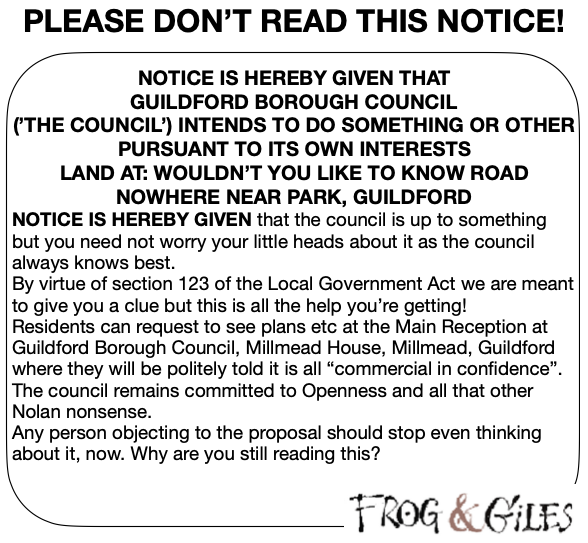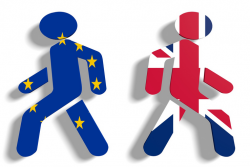 Abraham Lincoln
If given the truth, the people can be depended upon to meet any national crisis...
Abraham Lincoln
If given the truth, the people can be depended upon to meet any national crisis...
 Guildford news...
for Guildford people, brought to you by Guildford reporters - Guildford's own news service
Guildford news...
for Guildford people, brought to you by Guildford reporters - Guildford's own news service
Letter: The Brexit Agreement Will Prevent Divergence
Published on: 30 Dec, 2020
Updated on: 30 Dec, 2020
In response to: Local Reactions to News of Last-Minute Brexit Deal
The Brexit agreement means that we will, in effect, rejoin the EU anyway, since it contains very stiff penalties if the UK seeks to diverge on things like fisheries and the “level playing field” for industrial subsidies.
These penalties include so-called “remedial measures” which are temporary and suspend parts of the agreement, and more serious “rebalancing measures”, including tariffs, if we don’t comply. In other words, back to “No-Deal”. The EU’s size means it holds most of the cards, and each five-year review of the agreement is likely to involve a big new Brexit-type negotiation.
Second, there are all the things that the agreement has omitted, for lack of time: financial services (20% of the economy), student exchanges, aviation safety, mutual recognition of professional qualifications and technical conformity standards, equivalence of sanitary and phytosanitary standards for food and agricultural goods, police and security data exchange (as we’re now shut out of the Schengen database), the common European arrest warrant, health card, driving licence, and so on.
Each of these will involve many years of negotiations from a position of weakness, as countries like Switzerland have found.
How will future governments approach this? Polls show that a majority of people now think Brexit was a mistake. Personally, I believe it is a national catastrophe that has trashed Britain’s reputation without delivering a single redeeming advantage. I’m just a retired diplomat so what do I know?
No future government, however, is likely to be as fanatical about Brexit as this one, our most extreme and ideological since Oliver Cromwell. The future is therefore likely to bring a steady harmonisation and re-integration with our biggest market and neighbour.
Responses to Letter: The Brexit Agreement Will Prevent Divergence
Leave a Comment Cancel replyPlease see our comments policy. All comments are moderated and may take time to appear.

See Dragon story: GBC’s Explanation of Major Land Sale Notice Error ‘Borders on Arrogant’ Says Councillor







Recent Articles
- Latest Figures Show Two in Every Three Burglaries Went Unattended in Surrey
- Dragon Interview: The Thriller Writer Who is a Climate Change Ambassador
- Notice: Guildford Twinning Association Filmfest 2024
- Zero Re-opens Uptown
- Letter: I Hope the New CEO Will Reflect on the Constructive Advice
- Campaign to Encourage Visitors to the Surrey Hills To Go by Train
- Police Commissioner Office Ordered to Remove Social Media Messages
- Police and Crime Commissioner Candidate Interview – Kate Chinn
- Guide to Telephone Befriending Services for Older People
- Stage Dragon: Sleuth at the Yvonne Arnaud Theatre


Recent Comments
- H Trevor Jones on Campaign to Encourage Visitors to the Surrey Hills To Go by Train
- Patrick Streeter on National Trust’s Plans For Clandon Park: ‘A Great House Laid Bare’
- Angela Richardson on Guildford’s MP Joins Objectors to the Development of Protected University of Law Site
- Georgina Grant on Campaign to Encourage Visitors to the Surrey Hills To Go by Train
- Olly Azad on Letter: I Hope the New CEO Will Reflect on the Constructive Advice
- Martin Davies on Guildford’s MP Joins Objectors to the Development of Protected University of Law Site
Search in Site
Media Gallery
Dragon Interview: Local Artist Leaves Her Mark At One of England’s Most Historic Buildings
January 21, 2023 / No Comment / Read MoreDragon Interview: Lib Dem Planning Chair: ‘Current Policy Doesn’t Work for Local People’
January 19, 2023 / No Comment / Read MoreA3 Tunnel in Guildford ‘Necessary’ for New Homes, Says Guildford’s MP
January 10, 2023 / No Comment / Read More‘Madness’ for London Road Scheme to Go Ahead Against ‘Huge Opposition’, Says SCC Leader
January 6, 2023 / No Comment / Read MoreCouncillor’s Son Starts Campaign for More Consultation on North Street Plan
December 30, 2022 / No Comment / Read MoreCounty Council Climbs Down Over London Road Works – Further ‘Engagement’ Period Announced
December 14, 2022 / No Comment / Read MoreDragon Interview: GBC Reaction to the Government’s Expected Decision to Relax Housing Targets
December 7, 2022 / No Comment / Read MoreHow Can Our Town Centre Businesses Recover? Watch the Shop Front Debate
May 18, 2020 / No Comment / Read More







Stuart Barnes
December 30, 2020 at 10:48 pm
Isn’t it time for Remainers to accept the clearly expressed will of the people to leave the failed EU project?
The chances of our country rejoining the corrupt organisation are about as high as Jeremy Corbyn becoming the next PM.
David Roberts
December 31, 2020 at 11:54 am
The reality is that the forces of globalisation: mega-trends including climate change, digital technology, global markets, mass migration and pandemics, are going to push Britain and Europe closer and closer together.
Like it or not, we are doomed to cooperate ever more intensely, whether within the EU, under the new bilateral treaty or in some other framework.
We have left Northern Ireland in the Single Market and may soon lose Scotland into the same orbit. The never-never land of total sovereignty and “taking back control” is nothing more than a sentimental myth, bought at immense economic and reputational cost.
Roy Hogben
December 31, 2020 at 3:20 pm
“Polls show that a majority of people now think Brexit was a mistake.”
What a load of rubbish. Will these Remainers try and concentrate their minds in a positive way instead of incessantly carping on, about things that will not change.
Brexit is a most significant victory, regaining our independence to call ourselves Great Britain again, instead of a “state” within Europe.
Editor’s comment: In the most recent YouGov Poll conducted on Dec 17 (ie before the deal was agreed), in answer to the question, “In hindsight, do you think Britain was right or wrong to vote to leave the EU?” 38% said “Right”, 48% said “Wrong”, 14% said “Don’t know” (data collected online from a sample of 1,873 people over 18).
John Perkins
December 31, 2020 at 3:48 pm
I do not find David Roberts’ status as a retired diplomat impressive.
Whilst arguing for steady harmonisation and re-integration with our neighbours, the main reason given for it appears to be that, otherwise, they’ll be beating us up. Hardly a healthy relationship.
And polls showed that the referendum result would be in favour of Remain, right up to the day of the vote.
Perhaps someone can explain what advantage would be gained by rejoining the EU when the UK contribution would possibly double (probably without a rebate) and fishing rights would revert back to being allocated in favour of other countries?
Stuart Barnes
December 31, 2020 at 11:00 pm
As our greatest PM once said: “Rejoice; Rejoice; Rejoice!”
We are now out and free again. I am posting this at 11 pm on 31/12 so that is a fact now – despite the weeping and wailing from the Remainers. What a great day this is!
When will the very great Nigel Farage be given his peerage?
I wonder which will be the next country to exit the failed EU superstate?
John Schluter
January 1, 2021 at 10:53 pm
There are currently five countries applying to join the EU.
There are currently no countries contemplating leaving.
Margaret Thatcher was a proud proponent of the single market.
What is the opposite of ‘super’?
J Holt
January 2, 2021 at 8:42 am
Would these five countries be net contributors or recipients?
Serbia, Montenegro, North Macedonia, Albania, Turkey.
John Perkins
January 2, 2021 at 12:48 pm
Turkey is less likely to enter now that it’s main sponsor is no longer a member. Not that it was a serious prospect given it’s record on human rights, propensity to use military force in neighbouring countries and the implacable opposition of Greece.
The other four (Albania, North Macedonia, Montenegro and Serbia) have a combined population slightly more than Belgium and a combined GDP slightly above that of Luxembourg.
Certainly no other member has applied to leave, but it’s not obvious how anyone can be sure of what they are “contemplating”.
Margaret Thatcher was indeed a strong supporter of the single market, perhaps even its main architect, but she was also a trenchant opponent of the EU in its current undemocratic form.
David Roberts
January 1, 2021 at 1:04 pm
The polls say it all, and the proof is there in black and white in the Brexit deal: Britain has not escaped, and cannot escape, the tight embrace of Europe.
That was already the case long before we joined the EEC and will still be the case long after we’ve left the EU. In that sense the Remainers have won.
John Perkins
January 1, 2021 at 11:07 pm
Polls say nothing other than what their commissioners ask.
Ross Connell
January 2, 2021 at 12:10 pm
The Brexiteers chose sovereignty over market access. So be it for now. It is claimed we regained our (Parliamentary) democracy. But these same people sought to prorogue parliament and now delay its being reconvened.
Unless I’m mistaken during UK EU membership we enjoyed democratic elections so what real democracy do they seek? How has EU curtailed our trading elsewhere, for example with the US?
I am still a Remainer but now a Rejoiner, although alas probably not in my lifetime.
David Roberts
January 3, 2021 at 11:40 am
If polls are untrustworthy, why is one single poll, from over four years ago, still misrepresented as “the will of the people” (see first comment above)?
Let’s just agree that public attitudes towards Brexit are mixed and contradictory – which is precisely why there can be no closure, and no clean break from the EU.
John Perkins
January 3, 2021 at 3:56 pm
Opinion polls are a request for an opinion from a small subset of the population, whereas the referendum was a poll of the entire voting population in a secret ballot.
It’s misleading to conflate the two.
Barbara Ford
January 4, 2021 at 12:27 pm
Isn’t it time to deal with reality, rather than endlessly rehashing whether or not it’s a good idea to be where we are now? For better or for worse, the divorce has happened, let’s make the best of it now.
In case you think it’s relevant to my view, I voted to Remain. I have assorted foreign nationals in my family and my ancestry, and yet I’m sick of the argument.
David Roberts
January 5, 2021 at 12:47 pm
I totally agree with Barbara Ford. But making the best of the real situation means staying completely engaged with the arguments, which are going to go on indefinitely and affect us all greatly.
Pretending that anything much was settled on January 1 is an escapist delusion.
Stuart Barnes
January 6, 2021 at 9:05 am
It is very boring to have seemingly non-stop bad loser messages from Remainers about the settled democratic decision of the British people to escape from the clutches of the corrupt EU. The decision has been welcomed by most and it is time to move on.
Please let us have no more of this on The Dragon. Give us a rest, it is over – get used to it.
Editor responds: We will continue with our policy that everyone has a right to their point of view.
Andrew Eacott
January 6, 2021 at 7:59 pm
It’s equally boring to see the same Brexiteer waffle yet again with no evidence to support their claim that the country will be better off now they have achieved their aim.
They won. Now they should prove to the country that it wasn’t all just a PR exercise. Let them demonstrate a clear benefit that puts us in a measurably better position than we had for that past 47 years (just one or two will do). Until then, I’ll reserve the right to point out that a sizeable proportion of the country think we did a monumentally stupid thing.
Brexiteers love to talk about democracy but conveniently miss the point that people are allowed to disagree. If we’re all supposed to grin and bear it, why didn’t the Tories all go home in 1997 when Labour won a landslide?
John Perkins
January 8, 2021 at 10:23 am
Talk of “waffle”, “no evidence”, and “should prove” is pointless. The arguments were made five years ago (and ad nauseam ever since).
And what exactly is the evidence that a sizeable proportion of the country think we did a monumentally stupid thing? Could it be that most who voted Remain think that the result was merely regrettable, but that stupidity has nothing to do with it? Claiming the “silent majority” agree with a personal view is discreditable.
All that is necessary for those wanting benefits to be demonstrated is to wait and see. The next five years should be sufficient to show whether or not success can or will be achieved. Crying “are we there yet daddy?” won’t make any difference.
One benefit is that action such as that by President Macron in closing the border to trade will now be subject to international, rather than EU, law.
David Roberts
January 8, 2021 at 6:11 pm
I am sorry that my letter has provoked so much windy rhetoric. Of course we have left the EU, never to return probably for generation or two. But so little was actually settled on January 1 that we will still be arguing about key issues with Brussels in ten or fifteen years’ time. That is how long it will take (in my own experience of international talks) to get the relationship sorted out reasonably comprehensively.
In the meantime, we remain bound hand and foot to the EU, no longer as a member but through our patchy new bilateral agreements as well as through our geographical proximity, personal connections and economic dependence as a net importer of just about everything.
The danger for good policy-making is that both sides now lose interest – Brexiteers because they imagine they’ve “got Brexit done” and Remainers because they just want to forget the whole sorry mess. But while institutional arrangements have changed, almost every aspect of British life remains deeply enmeshed with Europe. And on most issues we are in the weaker negotiating position, our global influence having been shot to bits. I therefore predict a longer-term drift back towards our natural partners in the EU, as less extreme governments jettison hard-Brexit policies.
John Perkins
January 9, 2021 at 3:38 pm
Windy rhetoric it indeed is, given that the UK is no longer a member and any attempt to get it to rejoin might founder on the rocks of economic cost and the intransigence of some of the remaining members.
But some boring statistics should give pause for thought.
The electorate in the 2016 referendum was 16% greater than that held in 1975, nearly 6.5 million people more; nearly eight million more voted in 2016.
The Leave (No in 1975) vote more than doubled between the two, while Remain (Yes) declined by 7% or 1.2 million. On that trend the Rejoin vote might attract no more the 15 million votes in a couple of generations.
I voted Yes in 1975 and it was 20 years before I changed my mind. Going by the statistics, it looks as though I was not alone in realising my mistake.
Those committed to blowing on the embers of rejoining might want to consider why, after the costs of exit, a majority would accept the cost of re-entry. Especially given the decline in support for the EU, which appears to be based on experience.
It’s easy to understand why politicians and bureaucrats might want to be part of the EU given the vast salaries and protected pensions. And the example of Jacques Poos (allowed to dominate the world stage like the colossal Stonehenge facsimile in This Is Spinal Tap) must have some appeal to SNP leaders.
David Roberts
January 10, 2021 at 4:58 pm
To conclude, no-one in this discussion is saying we should rejoin the EU. So that is a red herring.
My point is that we hardly need to: we remain closely tied to the EU despite leaving it, and will probably get closer as time goes by for the many reasons given.
If, instead, people choose to believe Britain is freer and more independent since January 1 (let alone richer or more powerful), they are likely to be disappointed, although a quasi-religious faith in Brexit may offset this.
It will never be known, for instance, how our economy would have fared inside the EU, but the loss of Scotland and Northern Ireland is likely to be a fairly clear indicator of national failure.
John Perkins
January 11, 2021 at 9:21 am
In the first sentence of his letter David Roberts writes “we will, in effect, rejoin the EU anyway”. He should not be surprised if that is construed as saying we should actually rejoin.
Of course it would be counterfactual to claim to know how our economy would fare had we remained in the EU, but we can gain some insight from observing those who do remain.
Presenting “the loss of Scotland and Northern Ireland” as if it were fact is quasi-religious faith.